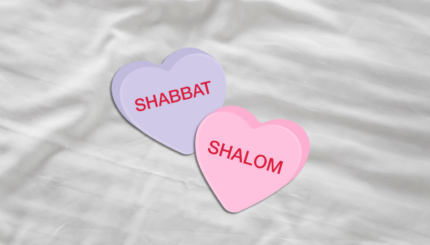Earlier this month we heard from Jordan Dashow about how having
pride in his queer identity
meant having pride in his Jewish queer identity. Now Jordan reflects on being a survivor of sexual assault—and how that experience further defines his identity as a proud LGBTQ Jew.
(Trigger warning: This post discusses issues related to sexual violence.)
It is April 2, 2014, over three-and-a-half years after I publicly came out as gay on Facebook. I am in a classroom at Tufts University, not paying as much attention to the professor as I should be, as I contemplate what I had drafted moments before I left for class. My heart is racing. I am staring at my computer screen, full of white and blue pixels, as my hand hovers over my laptop’s touchpad. It feels like the last few years have all been leading up to this moment. I know people will notice. I know they will talk about it. I question whether I should restrict my post so no one on my limited profile—most of the adults I’m friends with—can see it. I hesitate, yet I make my decision. I click the blue button that says “post.” My status, a call for people to attend “It Happens Here” at Tufts, begins: “3.5 years ago I was sexually assaulted at Tufts University.”
Coming out as a survivor of sexual violence has been a difficult process, and in some ways it has been even more difficult than coming out as queer. Whereas our heteronormative society teaches queer people that there is something wrong with us, our society which is steeped in rape culture—a culture that excuses, normalizes, and at times even condones rape—teaches survivors that not only is the sexual assault partially our fault but that we should hide our identities. For me, knowing who I could confide in about my experiences as a survivor was even more difficult than figuring out who I could confide in about my sexuality.
So do I take pride in my identity as a survivor? It seems like an odd question to ask, especially considering the physically, emotionally and psychologically violent experience that comes with that identity. Yet, it is an important question. Too often survivors, like queer individuals, are expected to remain silent about this part of their identity. And I refuse to be silent.
So yes, I am proud. I am not proud of what was done to me, but I am proud of who I am. I am proud of how I have turned my experience into a tool for advocacy. I am proud that in a society that tells me I should shun this identity, I have found a way to embrace it. To own it. To not be ashamed by it. Because, ultimately, even our negative experiences inform who we are.
As I said in my last post, taking pride in your identity is when you no longer only reveal that identity when it is unavoidable but freely offer up that information because you have nothing to be ashamed of. And when it comes to being a survivor, we shouldn’t be the ones who are ashamed. Our assailants should be.
But why even talk about this? It may seem odd to be discussing my identity as a survivor in a post about Jewish queer pride but for me, it could not be any more appropriate. I am writing this post in May, a month after Sexual Assault Awareness Month, although it will be posted during LGBT month. For me, those two months are inextricably linked.
At the end of the day, our identities do not exist in a vacuum. My queer identity is shaped by my identity as a Jewish survivor. My Jewish identity is shaped by my identity as a queer survivor. And my identity as a survivor is shaped by my identity as a queer Jew. I cannot separate these identities from each other nor can I separate them from any of my other identities. The fact of the matter is, I cannot truly have pride in my Jewish queer identity if I do not take pride in my identity as a survivor as well.
So let this LGBTQ Pride month not just be an opportunity for us to take pride in our LGBTQ identities; let it be an opportunity to take pride in all of our oppressed identities. You do not need to love the experiences that gave you those identities or resulted from those identities; however, I do strongly believe that we need to have pride in ourselves, and that is only possible once we reject the stigmas society has put on our oppressed identities and have taken ownership of them for ourselves. So let this LGBTQ Pride month be an opportunity to recognize that all of our identities inform our queer identity, and let’s take pride in that. Because that’s nothing to be ashamed of.
Sexual Assault Resources
:
The National Coalition of Anti-Violence Organization Members
are LGBT anti-violence organizations across the country. This list includes organizations listed by state, alphabetically, with support for survivors of sexual assault, partner abuse, and hate violence.
The Network/La Red hotline
provides emotional support, information and safety planning for lesbian, gay, bisexual, queer and/or transgender (LGBQ/T) folks, as well as folks in SM/kink and polyamorous communities who are being abused or have been abused by a partner. They also offer information and support to friends, family or co-workers on the issue of domestic violence in LGBQ/T communities. You don’t have to leave or want to leave your relationship to get support. The hotline is available Monday through Friday from 9 a.m. to midnight, Saturday from 1-6 p.m., and Sunday from 1 p.m. to midnight. Call
617-742-4911
(voice) or
617-227-4911
(TTY).
The Rape, Abuse & Incest National Network
: Find “live help for sexual assault victims and their friends and families” at the
RAINN national sexual assault online helpline
. It is free, confidential, and secure.
Moved by this post? Join the conversation through MyJewishLearning’s weekly blogs newsletter.


